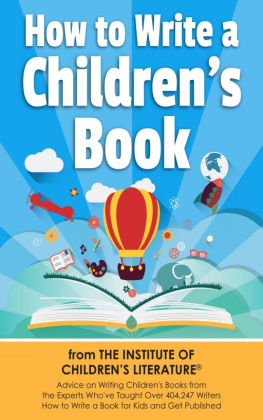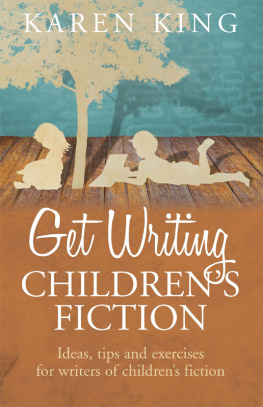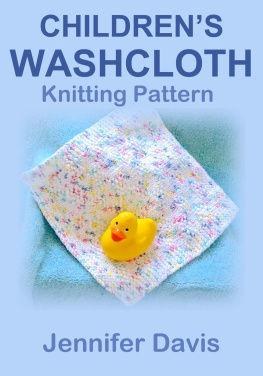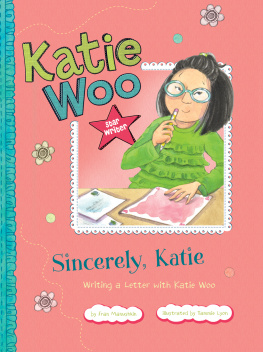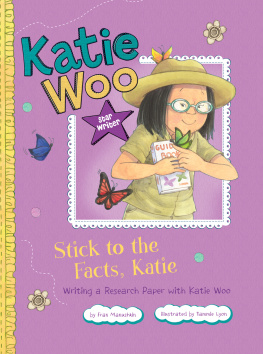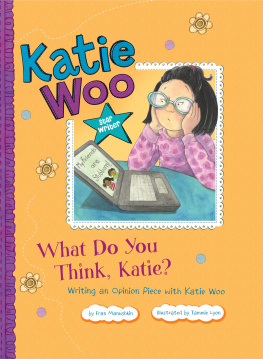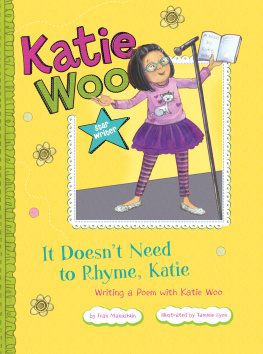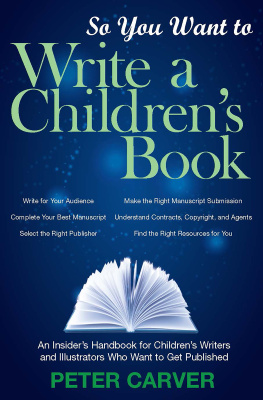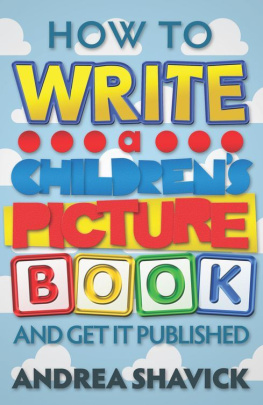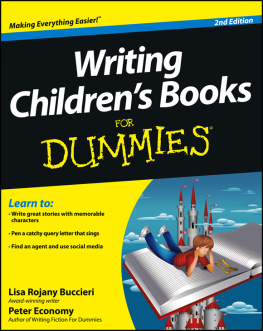
HOW TO WRITE
A CHILDRENS BOOK
Compilation and edited by
KATIE DAVIS
Director, Institute of Childrens Literature
Smashwords Edition
How to Write aChildrens Book
Compiled andedited by Katie Davis, Director, Institute of ChildrensLiterature
The contentcontained in this guide is for informational purposes only. To be awriter you need passion and perseveranceoh, and a thick skinbecause people will tell you negative things about your babybook.
First editioncopyright 2016 Institute of Childrens Literature
All RightsReserved. No part of this publication may be reproduced ortransmitted in any form or by any means, electronic or mechanical,including photocopy, recording, or any information storage andretrieval system, without written permission from the author.
A To all the writers who
write to get it right
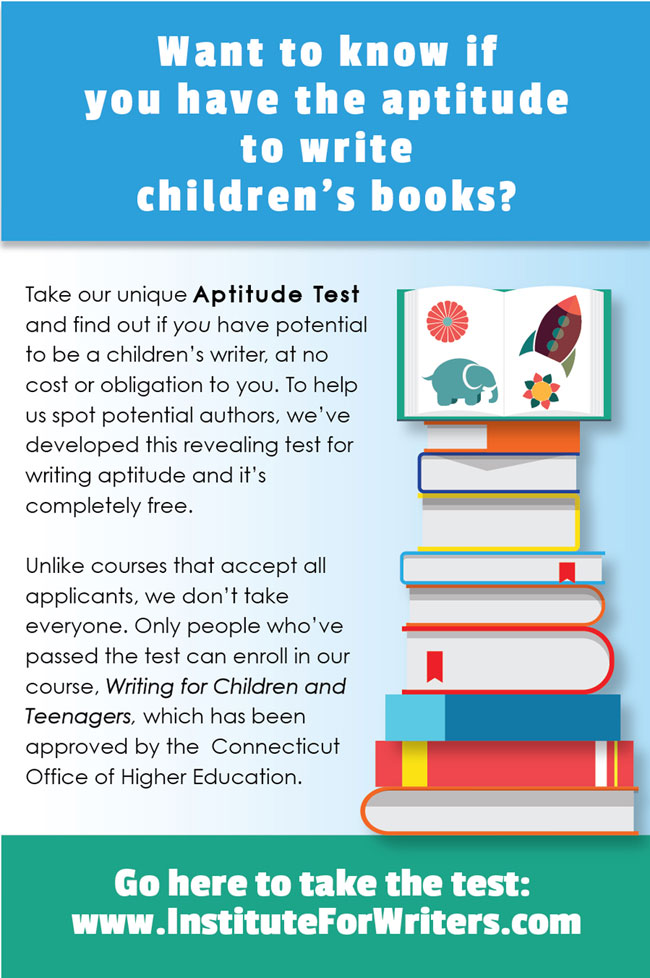
Table ofcontents
HOW TOWRITE A
CHILDRENSBOOK
This book has tips on how to write and publish a book forkids and advice on writing children's books. It has been compiledand edited by Katie Davis, Director of the Institute for Writersand the associated Institute of Childrens Literature. These twoschools have taught over 404,000 students how to write a book forchildren and get published. Katie Davis is the award-winning authorof the Amazon Bestseller How to PromoteYour Childrens Book.
INTRODUCTION
You want to become a better writer, and you want tolearn how to write a childrens book. Maybe youd like to learn howto write for teenagers as well. This book will help introduce youto a way to do that. Much of the information is inspired by the Instituteof Childrens Literature (at http://institute forwriters.com ) and thecourse (and its associated web site) that teaches writing forchildren and teenagers. As the director of the Institute, its mypleasure to share some of the basics of the course and our site.Although registered students are given one-on-one guidance andinstruction from published writers and editors, and can earncollege credits, this guide will help you get started.
Of course, just reading a book wont teach you towrite. The best way to learn to write is to read a lot ofbooks in the genre and for the age level youre interested inasmany as you possibly can. The best books to read are thetraditionally published bestsellers you find in bookstores, whetherbrick and mortar, or online. Ironic, considering this is aself-published book.
So why do I write that? Because these books are themost recent, and you know professional editors and copyeditors haveworked on them. Yes, there may be wonderful self-publishedchildrens books to read, but there is no guarantee an editor hashad at them and polished that book to a gleaming (professionallevel) shine.
Id like to thank Jan Fields, one of the Institutesesteemed and talented instructors, for contributing content to thisbook, as well as the authors whose articles appear here, reprintedfrom a selection of the Institutes annual directories.

WHERE DOYOU
GET YOURIDEAS?
One of the most frequent questions writers are askedis, "Where do you get your ideas?" Sometimes it's cloaked in aneasier form: "Where did you get the idea for that story?" But oftenit's a general question with tough-to-find answers. Where do we getour ideas? Does a muse whisper them in our sleep? Do we go to theidea store in Schenectady? Do we wait for some clever person tosell us an ideaoffering to split the profits from the resultingbook? Where do we get our ideas?
What Do the Experts Say?
Lets ask these published (and very popular)authors:
Bruce Hale: "From a small man named Guido wholives in my basement and makes them for me. No, actually. I thinkideas come from the collision of two things that werent combinedbefore like geckos and mysteries. Ideas are a little bit magical,but if you keep your antennae up, theyre all around you. Just askthe question, What if ? and youll get an idea rolling."
Betsy Byers: "Since my books are mostlyrealistic fiction, I get my ideas from the things that happen tome, to my kids, to my dogs and cats, to my friend's dogs and cats,and from things I see on TV and read about in the newspaper. Isometimes think my books are like scrapbooks of my life becausealmost every incident brings back a memory."
Tedd Arnold: "My ideas come from differentplaces at different timessometimes from something one of mychildren said; perhaps from seeing something outside, for example,watching animals; sometimes from just letting my mind wander. OnceI have an idea, I write it down so I won't forget it. Of course,having an idea doesn't mean you have a story. Sometimes an ideaimmediately makes itself into a story in my head. Other times I putthe idea away and forget about it. But my mind doesn't evercompletely forget the interesting ideas. My mind keeps quietlyplaying with them. Then suddenly one day I may fit that idea into astory. Or I might combine two ideas into one story. When I havemost of the story worked out in my head, I go to my paper orcomputer and start writing. Once in a while, I will open my folderof idea notes that I've jotted down and see if those old ideasfinally spark a story. Sometimes they do. Sometimes they don't. Younever know."
Holly Black: "I guess they come from things Ilike, my subconscious, and my past experiences. And what I wish myexperiences had been. There are also movies and books that havemade me feel a certain way that I want to be able to capture."
Judy Blume: "I used to be afraid to answerthat question. I thought if I ever figured it out I'd never haveanother one! But now I know that ideas come fromeverywherememories of my own life, incidents in my children'slives, what I see and hear and readand most of all, from myimagination."
R. L. Stine: "Goosebumps fans arealways asking me that question. And it's not an easy one to answer.Think about where you get your own ideas. They come fromeverywhere. People you meet. Stories. Movies. Dreams. Memories.Thin air!"
Robin McKinley: "The short answer is: Ihavent a clue."
Jane Yolen: "I am always asked where I get myideas from. That is a very difficult question to answer, since Iget my ideas from everywhere: from things I hear and things I see,from books and songs and newspapers and paintings andconversationsand even from dreams. The storyteller in me asks:what if? And when I try to answer that, a story begins."
So WhereDoIdeas ComeFrom?
Ideas come from ...
Freedom: When we give ourselves permission todaydream; when we value our down time and the free flow ofthoughts, we invite in ideas.
Next page
